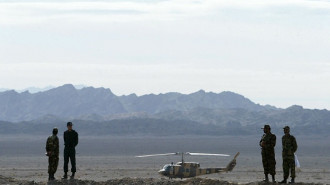Amnesty chief meets Palestinian president, vows to expose Israeli apartheid
Palestinian President Mahmoud Abbas received Amnesty International head Agnès Callamard in Ramallah on Wednesday, a day after the human rights organisation published a damning report saying that Israel is engaging in apartheid against Palestinians.
Callamard and other Amnesty representatives presented the extensive report to Abbas after receiving an invitation from him, she told Palestinian media.
At the meeting, Abbas praised Amnesty's "great effort … through several years of searching for the truth," the Palestinian Authority's Wafa news agency reported.
Abbas said that "Palestine will follow up with all countries and organisations in the world in order to explain what was stated in the report and implement measures that protect the legitimate rights of the Palestinian people”, according to Wafa.
Callamard told Palestinian media that "there was an in-depth discussion about the work they [Amnesty] are doing to put an end to apartheid".
Amnesty's report was met with outcry from Israel and its main ally, the United States.
"Israel has refused any discussion of the report, but Amnesty will continue its work until the crimes of apartheid committed by Israel are exposed," she reportedly said.
President Mahmoud Abbas received Amnesty International's Secretary-General, Agnes Callamard, and discussed with her the organization's report on Israel's practice of apartheid against the Palestinian people.https://t.co/7u1Qpm0iPY pic.twitter.com/R93IyDvmhr
— Wafa News Agency - English (@WAFANewsEnglish) February 2, 2022
Amnesty’s report presented documentation and analysis of Israeli practices against Palestinians since 1948.
The report was the first time that Amnesty has described Israel's system of oppression as "apartheid", a term first used to describe institutionalised racial segregation in South Africa last century.
Other human rights groups including Human Rights Watch and B’Tselem have previously used the term, as have scholars of international human rights law.

![Palestinians mourned the victims of an Israeli strike on Deir al-Balah [Getty]](/sites/default/files/styles/image_684x385/public/2024-11/GettyImages-2182362043.jpg?h=199d8c1f&itok=xSHZFbmc)


![The law could be enforced against teachers without prior notice [Getty]](/sites/default/files/styles/image_684x385/public/2178740715.jpeg?h=a5f2f23a&itok=hnqrCS4x)
 Follow the Middle East's top stories in English at The New Arab on Google News
Follow the Middle East's top stories in English at The New Arab on Google News
![Fakhrizadeh [AFP] Fakhrizadeh [AFP]](/sites/default/files/styles/image_330x185/public/media/images/774C39F7-8F7A-4D67-B998-27D102FCB4A7.png?h=d1cb525d&itok=j9eGvunV)

